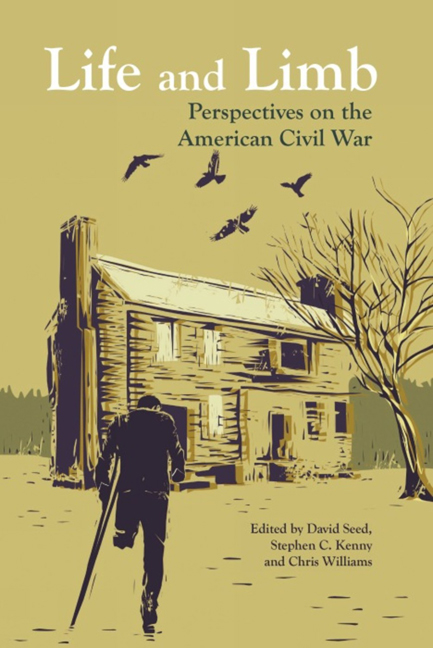Book contents
- Frontmatter
- Contents
- List of Illustrations
- Acknowledgements
- Introduction: Civil War Voices and Views
- MEDICAL AND SURGICAL MEMOIRS
- ACCOUNTS OF NURSING
- MEDICAL FACILITIES AND PATHOLOGY
- Jonathan Letterman on the Medical Corps: Medical Recollections of the Army of the Potomac
- The Confederate Military Prison Hospital at Andersonville, Georgia: Contributions Relating to the Causes and Prevention of Disease
- Field Hospitals: A Glimpse: Hardtack and Coffee
- Field Hospitals: The Need: A Manual of Military Surgery
- Plea for an Ambulance Service: A Brief Plea for an Ambulance System
- Hospital Broadside: North Carolina Hospital Broadside, 1863
- Hospitals in Richmond, Virginia: A Diary from Dixie
- Malingering: ‘Surgical Reminiscences of the Civil War’ and A Rebel's Recollections
- Roberts Bartholomew on Nostalgia: Contributions Relating to the Causes and Prevention of Disease
- Medical Welfare Begins: ‘Debut and Prospectus (The Crutch) and ‘Wounded’ (poem by ‘Sanatosia’)
- (Dis)embodied Identities: Civil War Soldiers, Surgeons, and the Medical Memories of Combat
- PHOTOGRAPHY
- AMPUTATIONS AND PROSTHETIC LIMBS
- IN THE FIELD OF BATTLE
- POST-WAR NARRATIVES
- Contributors
- Select Bibliography
- Index
- Plates
The Confederate Military Prison Hospital at Andersonville, Georgia: Contributions Relating to the Causes and Prevention of Disease
from MEDICAL FACILITIES AND PATHOLOGY
- Frontmatter
- Contents
- List of Illustrations
- Acknowledgements
- Introduction: Civil War Voices and Views
- MEDICAL AND SURGICAL MEMOIRS
- ACCOUNTS OF NURSING
- MEDICAL FACILITIES AND PATHOLOGY
- Jonathan Letterman on the Medical Corps: Medical Recollections of the Army of the Potomac
- The Confederate Military Prison Hospital at Andersonville, Georgia: Contributions Relating to the Causes and Prevention of Disease
- Field Hospitals: A Glimpse: Hardtack and Coffee
- Field Hospitals: The Need: A Manual of Military Surgery
- Plea for an Ambulance Service: A Brief Plea for an Ambulance System
- Hospital Broadside: North Carolina Hospital Broadside, 1863
- Hospitals in Richmond, Virginia: A Diary from Dixie
- Malingering: ‘Surgical Reminiscences of the Civil War’ and A Rebel's Recollections
- Roberts Bartholomew on Nostalgia: Contributions Relating to the Causes and Prevention of Disease
- Medical Welfare Begins: ‘Debut and Prospectus (The Crutch) and ‘Wounded’ (poem by ‘Sanatosia’)
- (Dis)embodied Identities: Civil War Soldiers, Surgeons, and the Medical Memories of Combat
- PHOTOGRAPHY
- AMPUTATIONS AND PROSTHETIC LIMBS
- IN THE FIELD OF BATTLE
- POST-WAR NARRATIVES
- Contributors
- Select Bibliography
- Index
- Plates
Summary
Austin Flint (1812–1886) was an American Physician who pioneered the study of heart disease. He held a chair in clinical medicine in New Orleans before moving to New York. From 1861 to 1868 he served as professor of pathology in Long Island College Hospital. The following excerpt is taken from Chapter 3 of Austin Flint, ed., Contributions Relating to the Causes and Prevention of Disease, and to Camp Diseases; Together with a Report a Report of the Diseases, etc. among the Prisoners at Andersonville, Ga. (New York: Hurd and Houghton, 1867). Published for the US Sanitary Commission.
The US Sanitary Commission was established in 1861, with its headquarters in Washington, DC, to support Union casualties. From 1863 its members organized fund-raising Sanitary Fairs. The Commission established hospitals and rest homes, continuing operation after the war. The official account of its activities is Charles J. Stille's History of the United States Sanitary Commission, Being the General Report of Its Work during the War of the Rebellion (Philadelphia: J.B. Lippincott, 1866), at https://archive.org/details/ historyofuniteds00stiluoft.
The preface announces that the Commission ‘has not hesitated to criticize with the utmost freedom the policy and measures of the Government, where they seemed radically defective in providing for the care and comfort of the sick and suffering of the Army’ (v–vi).
The Hospital is situated near the southeastern corner situation of the Stockade, and covers about five acres of ground.
The larger forest trees, as the pine and oak, have been left in their natural state, and furnish pleasant shade to the patients.
The ground slopes gently toward the south arid east. A sluggish stream of water flows through the southern portion of the hospital grounds from west to east. The upper portion of this stream is used by the patients for washing their clothes, whilst along the borders of the lower portions logs have been ranged upon which the patients may sit and evacuate their bowels. This part of the stream was a semi-fluid mass of human excrements, offal, and filth of all kinds.
This immense cesspool, fermenting beneath the hot sun, emitted an overpowering stench.
The banks of this stream south of the hospital inclosure [sic] are bordered by a swamp which spreads out toward the southeast.
- Type
- Chapter
- Information
- Life and LimbPerspectives on the American Civil War, pp. 59 - 61Publisher: Liverpool University PressPrint publication year: 2015



